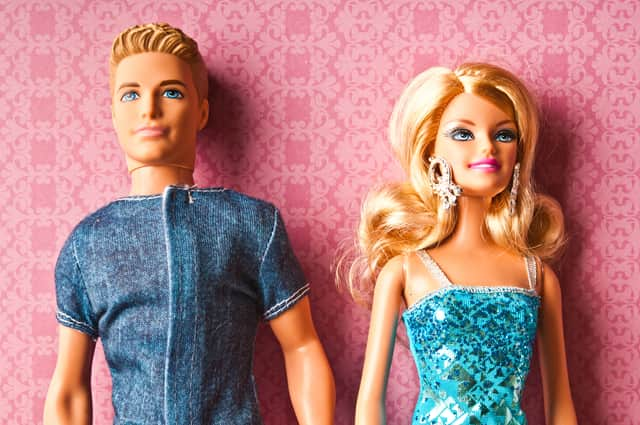Free Barbie and Ken dolls given to thousands of UK primary school children - but experts unsure of benefits
and live on Freeview channel 276
Thousands of primary school children across the UK have been given a free Barbie doll as part of a developmental programme - but the scheme has been met with some concern from experts.
Mattel, the company behind the legendary doll, launched the “Barbie School of Friendship” programme to help children carry out role play during their playtime. As part of the scheme, an estimated 15,000 children from 700 schools across the country have been gifted a doll - but it has been met with some criticism.
Advertisement
Hide AdAdvertisement
Hide AdAn investigation by the The British Medical Journal (BMJ) found some experts believe the programme is “stealth marketing” which could reinforce gender stereotypes. One expert who spoke to NationalWorld, Virginia Mendez, a feminist author who wrote the book Childhood Unlimited: Parenting Beyond the Gender Bias, also said she is “not huge fan of Barbie” for many reasons “including the unrealistic body shape and the still very limited representation and the heavy stereotypically definition of what womanhood is”.
Mattel said research it had sponsored with Cardiff University showed that playing with dolls offered “major benefits” for child development, however, including nurturing social skills such as empathy, which is why they had launched the programme to give children free Barbie and Ken dolls.
Loved for over 60 years, but is Barbie a negative role model?
The dolls have been popular with children for generations. Barbie first appeared on the shelves in 1959, and she’s been loved by children worldwide ever since. The release of the eagerly anticipated Barbie film in July 2023 has also created fresh excitement around the doll.
It’s no surprise then that Mattel has chosen this time to offer thousands of free dolls to children. Philippa Perry, a psychotherapist and author of books on parenting and education, told the BMJ, however, that the project makes her “suspicious that it may be exploitative” and added: “I feel faintly repulsed by it.”
Advertisement
Hide AdAdvertisement
Hide Ad

May van Schalkwyk, a specialty public health registrar, also at the London School of Hygiene and Tropical Medicine, told the BMJ: “Commercial entities like Mattel are not experts in children’s health or education, they are experts in selling products to maximise profits. The Mattel materials are heavily branded. Why should children be exposed to this type of stealth marketing?”
Schalkwyk added that, when compared with the use of other toys, exposure to a Barbie doll may have negative effects, such as shaping girls’ perception of their career options or their internalisation of the ideal of thinness.
Is Barbie changing the narrative for girls and improving representation?
Some experts do, however, believe that Barbie dolls can also be viewed positively. Mendez also acknowledged that Mattel has done “a lot of work” to create dolls which show different representations of women and girls. For example, she noted that at a time of Barbie’s release children were only given dolls that represented babies.
She added: “Barbie then changed the narrative from seeing themselves as mothers or carers to seeing themselves as future women. There are plenty of jobs for Barbie now and, in fairness to Mattel, they are working on the representation with more and more body shapes, body abilities or colours included. The world has moved really fast and Mattel is aware that they need to become part of that change.”
Advertisement
Hide AdAdvertisement
Hide AdA positive response from teachers and pupils
Mattel said that each school registered in the programme received a package of 12 Barbie and Ken dolls, lesson plans for role play activities, a guide for teachers, additional guidance concerning children with special educational needs and disabilities, certificates and stickers for pupils, a poster, a leaflet about a competition, information to give to parents, and additional images of dolls to be cut out.
A teacher from a school which had participated in the programme told the BMJ that the free dolls had been gratefully received. Lisa Georgeson, a teacher at Lord Blyton Primary School in Tyne and Wear, said that “given the current lack of funding in schools”, being given any free resources is “always a positive”. A teaching assistant at the same school delivered half hourly sessions once a week for seven weeks, working with around eight boys and girls in reception class, Georgeson added. She said that the children enjoyed the sessions, which did help them engage in positive discussions about friendship, social skills, empathy, stereotypes, disabilities, and kindness.
Sarah Gerson, a senior lecturer at Cardiff University who is a recipient of Mattel’s research funding, told the BMJ that statements made by Mattel claiming that playing with dolls offers major benefits to children were “a bit strong”. When asked to comment on criticism of the programme, a Mattel spokesman sent the BMJ testimonials from anonymous teachers celebrating the programme for the positive response it attracted from pupils and also the diversity of the dolls, in terms of body type, disability and skin tone.
Comment Guidelines
National World encourages reader discussion on our stories. User feedback, insights and back-and-forth exchanges add a rich layer of context to reporting. Please review our Community Guidelines before commenting.
